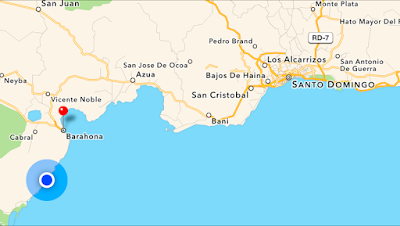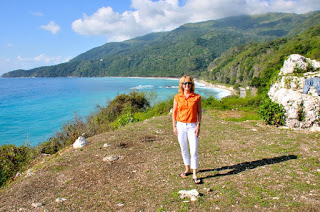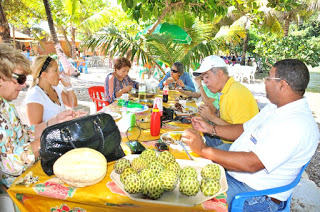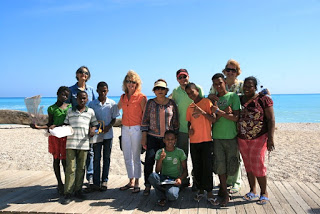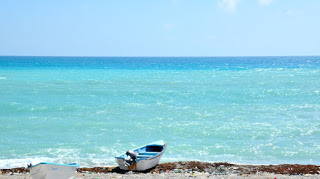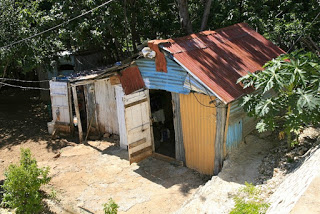5:30 am, in the near dark, a guest at Haydée’s house. Hayée is president of FAHEM, the hemophilia organization of the Dominican Republic, and a good friend and colleague. We’ve worked together for 18 years now. We share a light breakfast, eggs only, and a quick hola to housekeepers Isabel and Anna. Our team assembles on Haydée’s front patio: Fendi Bisono (a young man with hemophilia who is our main contact for Save One Life in the DR), Mecho, Haydée’s sister and treasurer of FAHEM, Eduardo, her husband, a successful architect, Dra. Joanne Taveras, the adult hematologist and also our friend (oh let’s face it; everyone here is friends with everyone! When they say Mi casa es su casa they are serious), Haydée of course, Zoraida, me and our driver José. We have a large van, very comfortable. And off we go! This
would be a 5-hour drive one way to visit one family, a factor X deficient
family. Factor X deficiency is quite rare, but Dra. Joanne tells us that in
this section of the country, out past Barahona, almost to the Haitian border,
there are several families with it.
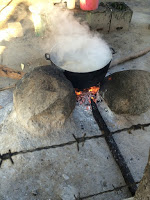 |
| Cooking pot at rest stop |
We navigate the
crowded streets of Santo Domingo and finally open up to the highway and
countryside. The further away we drive from the capital, the more we see the pretty
mountains that define this island. The sky is bluest blue, a cobalt canopy over
tender, green carpeted hills.
passes the time by sharing all sorts of things, in Spanish, and I miss most of
the conversation. Then she and her fellow committee members do word games from
a phone app. It gets to be a lively competition. We take a break along the
route, and a small rest stop. It’s a little store front, stand alone, with sad plastic
chairs in the dirt out front for patrons, with chickens running about, and soup
cooking out back in a black cauldron over an open fire. I’m looking for a
bathroom out back, and all they have is an outhouse. And by that I mean
corrugated metal sheets to form a wall, wired together around a hole. Just as I
am about to pry open the alleged door, Eduardo, laughing, points to the little
cottage right next door, also a restaurant with a proper bathroom. Of course
none of even the proper bathrooms have soap, paper or driers. It’s always bring
your own.
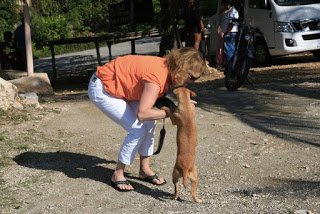 On we go. About
On we go. Aboutthree hours in we stop again, this time at a seaside road stand on a hill. The
view is breathtaking. Behind us, volcanic mountains that jut up from the
ground, draped in vibrant green. In front, the crystal blue Caribbean Sea, with
frothing waves, with water so beautiful and pure, the waves seem to melt diplomatically
into one another gently, rolling and crashing into the hillside on which we’re
all perched. A yellow dog runs to greet me and frantically paws my white pants,
dotting them with her prints. She senses correctly I’m the dog-lover of the
group and follows me about. I promise myself to being a box of Milkbones on all
future trips, in addition to factor and all the other goodies.
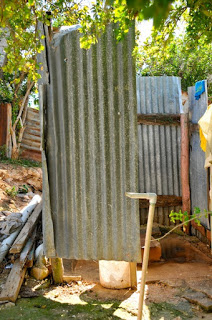 |
| Typical outhouse |
Several roosters
are imprisoned in little upside down wire cages, advertising their availability
as dinner. They cluck in confusion. In two huge rusty kettles, lunch is
cooking, the smoke trapped inside by palm leaves acting as tops. The family
that owns the roadside vendorship smiles reluctantly at us, perhaps sensing we
aren’t hungry enough to buy lunch yet. A bay stretches out from our vantage
point. Beyond that bay lives the family we will see, still an hour ride away.
in the DR. Our ride, in a clean
and new van, is smooth and comfortable. We make one final stop at Dr. Joanne’s
mother’s holiday home, a wonderful place, like a tropical oasis! A natural waterfall
rushes into a man-made pool, fringed on all sides by stunningly towering palm
trees and moist flowering plants. José, our driver, cuts a branch from the tree
next to the van, which has a tangle of roots cascading down from its massive
branches and a substance oozes out. Caucho,
he says. Rubber.
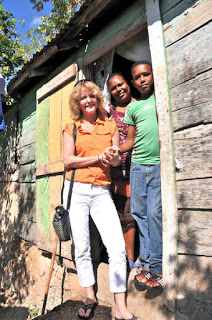 |
| Laurie Kelley with Adrian and mother |
We finally reach
our destination, the neat little home of the Acosta family, who turn out to
greet us. Haydée hugs the mother, Jhoann, like a sister. Everyone is
introduced. This is the first time FAHEM has been out to visit the family. The
family is impressed and honored. And they know why we are here: to enroll the
two sons with hemophilia in Save One Life.
sits right on the roadside, is in good shape. It’s a saltbox: four walls, wood,
with pressed wood inside for dividers. The dividers are home-made and wobbly.
One room is the bedroom, one the entry room, where a small, lone, scarred table
stands, and one room the kitchen, mostly empty. They don’t own much: one bed,
one table, a washing machine that seems oddly out of place, a stove. Two small,
rickety chairs, and two heavy chairs that Eduardo teasingly calls thrones.
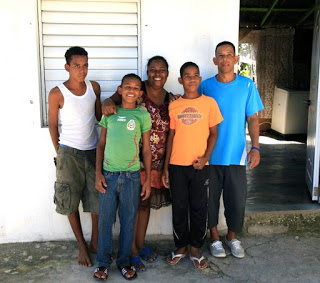 |
| The Acosta Family |
The boys are not
shy. Zoraida sets to work right away to interview them for Save One Life. She
takes out the enrollment forms, and standing, asks the boys a series of
questions. Both boys are small, and look to be about 8 or 9 years old, but in
fact are teens: 15 and 14. Abraham is 14, and in the 5th grade only.
He misses a lot of school due to bleeds, a common outcome of hemophilia in
developing countries. He loves math, and fishes in his spare time (later we
would see why). His brother Adrian is the wise guy. Charming smile, glib, he’s
15 and wants to one day be a doctor, because of all he has been through. Here
doctors are like gods; they determine the quality of life these children may
have. Adrian also likes to fish in his spare time.
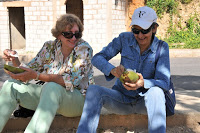 |
| Haydé de Garcia, president of FAHEM, with sister Mehco, treasurer |
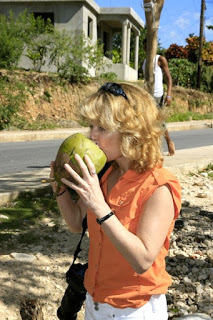 |
| Laurie Kelley enjoying fresh coconut |
The HTC, as we
just experienced first hand, is five hours away. It would cost the family $60
to go to get treatment. The father, Andris, only earns $100 a month. Do the
math. Despite the nice home appearance on the outside, there’s no toilet or
bathroom, only an outhouse. There’s no fridge; there is electricity, again jerry-rigged
from the street. There’s no tub or shower or any way to bath, except the sea. Food
is prepared using charcoal outside. It’s a rustic life. There’s no TV, no video
games, no cell phones. You can imagine then what a difference $24 a month will
make; it will actually be $48 a month, almost half the father’s salary, if both
boys get sponsored.
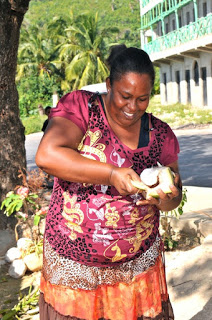 |
| Jhoann cuts out the coconut meat |
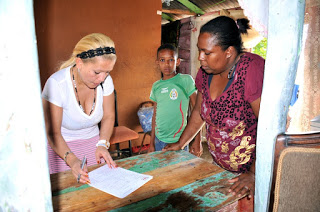 |
| Zoraida interviews the boys |
After the interviews,
we wait in the front of the house, and Andris grabs a bunch of green-husk
coconuts. Using a sharp machete, he lops the top off of each coconut and hands
us one. We sip the cool and refreshing coconut juice inside. Haydée and sister
Mecho sit on the slope in front of the house; Zoraida and I stand. When we
finish, Andris takes the machete and whacks each coconut again until it cracks
open. Then we peel out the coconut meat and eat it. I shock Andris by asking for
the machete. He reluctantly hands it over, looking at the group to see if I am
crazy. I want to slice my own open. After a few whacks it splits in two and
everyone laughs.
visit is done, we travel on to another seaside stop, this one at a cove. There’s
a perfect sea in front of us, the color of the most exquisite jeweled turquoise.
It stops you dead in your tracks to gasp at it. Abraham climbs a huge piece of
driftwood while I photograph his daring. We stroll along a boardwalk to the
cover, where there are nice shops. Apparently families rent the shops and prepare
meals to sell. This is what Andris’s wife Jhoann does. We are ushered by the
ever-charming Adrian to mismatched plastic chairs and a long table in front of
the quiet cove. Instantly a young cat and two wary dogs hover about. Hip-hop
music blares from a radio near us where teens are hanging out and swimming. We have
drinks, wine, a sugary fruit called anom that I take a sudden addiction to, and
best of all, parrotfish, grilled. It is simply the best fish I have ever had. I
ignore the gaping-mouthed-head and yellowed eyes and dive right for the sides,
despite the numerous bones. About 12 fish are brought out and we devour them.
And so does my kitten, which I deftly feed under the table after straining each
mouthful to remove the slender bones.
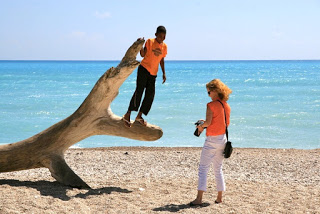 |
| Abraham shows off |
Adrian serves us
as magnificently as any waiter in a five-star restaurant and the food could not
be better. After our feast and siesta, we must hit the road. We hug, pledge to
get sponsors, and meander back out from the lush cove, to the naked beach and
sun, for photos and good byes.
trip back seemed to fly, as we had much to share and discuss. What a difference
we will make in the lives of this family; what a difference in our lives they
make to us.
See the DR 2016 Gallery and all photos here.

